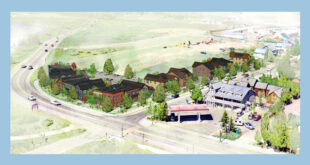Parameters still in the works for November ballot issue
By Kendra Walker
The Mt. Crested Butte Town Council continues to work toward defining a lodging tax that would ultimately fund future workforce housing and affordable housing projects. It appears the majority of the council is leaning toward a lodging tax on all short-term rental properties, including hotels, and they want to raise more than the $230,000 per year that a 1 percent lodging tax would generate. But an agreement on an appropriate amount is still undecided.
During a Town Council work session on Tuesday, May 21, council discussed next steps for the proposed ballot issue for the upcoming November vote. The group is working through ballot language that would be general enough to fall under the full umbrella of all workforce housing assistance, with the ability to prioritize specific projects later down the road.
“This is an opportunity to be forward-looking,” said councilman Dwayne Lehnertz. “We need to build this fund to take advantage of opportunities as they come up; it might be building something, it might be a foreclosure, it might be payment assistance, it could be all of those things. Whatever they may be and however varied they may be, we want to have money ready to go for those things.”
Councilman Nicholas Kempin added, “The priority is housing for our staff. We want to make sure we take care of our own and support them as a town and government.”
However, council is still determining to whom and what the tax would apply and how much it would cost. Debate among the group was whether the tax should cover the full spectrum of short-term rentals. Short-term renters in Mt. Crested Butte currently pay 13.9 percent in sales tax.
“Anything that rents for less than 30 days is a short-term rental,” clarified town manager Joe Fitzpatrick, “whether done by the owner, through a rental-by-owner website, by a management company or as part of a hotel.” He later added, “We’re asking the taxpayers to allow us to charge our guests.”
Concern was raised about hotels falling into the lodging tax because of fees and taxes already paid by their guests, as well as the question of whether hotels contribute to the lack of affordable housing in the first place.
“The conversation we’re having is really designed to get more local workers into houses and to utilize whatever’s causing the shortage of housing,” said councilman Steve Morris. “To me, the hotels haven’t really been a reason why people don’t have a place to live here … That’s why I view them as separate.”
Mayor Janet Farmer countered, “They [hotels] actually are a large part of our seasonal people who need lodging. They’re a huge chunk of our workforce. The tourists need all of those extra people.”
“Splitting it out would be a logistical nightmare,” said councilman Roman Kolodziej. “The Grand Lodge is no different from someone renting out their home in Eagle’s Nest. It seems like it has to be across the board. What we’re trying to do is have tourism pay its way and mitigate the impacts of it.”
A final agreement was not made but council is leaning toward the lodging tax to include anything defined as a short-term rental, including hotels.
As for how much, Farmer said, “It’s going to take a number of years to build up anything substantial.” And the council isn’t ready to make a final decision on the tax percentage. Council felt a 1 percent lodging tax across the board would be too low to make a substantial impact. The group did agree that it would be worthwhile to check how the lodging tax compares with other ski communities’ short-term rental fees.
The Town of Crested Butte passed a ballot initiative in 2017 to implement a 5 percent tax increase on vacation/short-term rentals for its affordable housing fund, which went into effect January 2018. This vacation rental excise tax does not apply to hotels. The Town collects 18.4 percent from vacation/short-term rentals in total, and collected $285,447 from the 5 percent excise tax portion in 2018.
“I think having a goal of somewhere between $400,000 and $500,000 per year would actually allow us to put money in the bank that can make an impact,” suggested councilwoman Lauren Daniel, referring to the town of Crested Butte’s lodging tax. “I’m not saying that we have to do a project like what they did in town [with Anthracite Place], but just as a place to start.”
“If we’re throwing numbers out, I’d love to see $800,000 [annually] as my magic number,” said Morris. “3.5 percent with a 5 percent maximum cap.”
Town attorney Kathy Fogo also suggested the tax could be lowered after a few years if the funding becomes sufficient to do what’s necessary. “Once we build up funds, we could cut back,” she said.
“You can make an affordable project practical,” said community development director Carlos Velado. He suggested the town doesn’t necessarily have to raise enough to do a complete project on its own but could rather contribute to a project with partners and help subsidize the cost to make projects more viable. “With limitations for affordable housing here and the high cost of land and high cost of construction in the valley, you have to have those contributions to make it work and it makes a difference.”
Council is not yet ready to write the ballot issue, but will continue to discuss parameters leading up to the September 6 deadline in order to include it on November’s ballot.
“We’ll have to come back to that discussion about how much we actually want to raise and whether it would be across the board or not,” concluded Farmer. “And at some point we’ll have to prioritize what the funding is for down the road.”
 The Crested Butte News Serving the Gunnison Valley since 1999
The Crested Butte News Serving the Gunnison Valley since 1999


